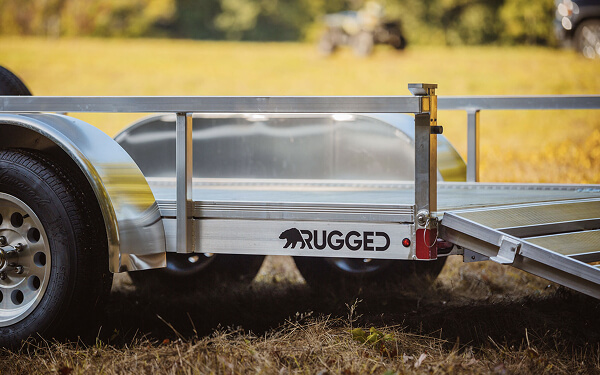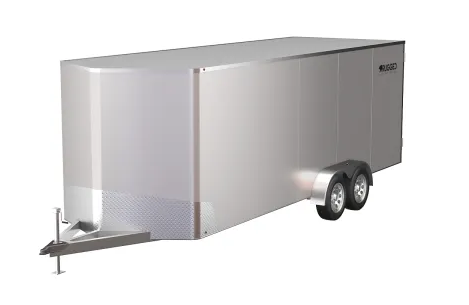How Much Do Utility Trailers Weigh? (Full Chart by Size & Material)
If you’re researching trailers, one of the first questions that comes up is: how much does a utility trailer actually weigh?
It’s an important question — because trailer weight determines what you can tow, how much you can haul, and which vehicles are suitable for the job. Lighter trailers mean easier towing, better fuel efficiency, and more payload capacity.
This guide breaks down estimated aluminum utility trailer weights by size, compares them to typical steel trailers, and explains why aluminum gives you such a significant advantage.
Why Trailer Weight Matters
Understanding trailer weight helps you make smarter decisions about what you tow and how safely you tow it.
- Payload Capacity: The lighter the trailer, the more cargo you can carry before reaching your trailer’s GVWR (Gross Vehicle Weight Rating).
- Vehicle Compatibility: Lightweight trailers open up towing options for SUVs and half-ton pickups.
- Performance & Efficiency: Shedding hundreds of pounds reduces drag, improves braking, and increases mileage.
- Durability & Handling: A properly balanced, lighter trailer rides smoother and puts less strain on your vehicle.
That’s why every Rugged Aluminum Trailer is engineered to deliver strength without unnecessary weight — fully welded, corrosion-resistant, and built to last.
Estimated Trailer Weights by Size & Material
The table below shows estimated empty weights for Rugged Aluminum Trailers and approximate averages for comparable steel models.
Use these figures as a general guide — actual trailer weight and payload capacity will vary depending on configuration, decking, walls, and installed accessories.
| Trailer Size (Feet) | Estimated Aluminum Weight (lbs) | Typical Steel Weight (lbs) | Approx. Weight Savings (Aluminum vs. Steel) |
|---|---|---|---|
| 5×8 | 470 – 540 | 900 – 1,200 + | 400 – 700 lb lighter |
| 5×10 | 490 – 610 | 1,000 – 1,300 + | 450 – 700 lb lighter |
| 6×10 | 590 – 700 | 1,200 – 1,500 + | 500 – 800 lb lighter |
| 6×12 | 670 – 740 | 1,300 – 1,700 + | 600 – 950 lb lighter |
| 6×14 | 750 – 840 | 1,500 – 1,900 + | 700 – 1,000 lb lighter |
| 6.5×12 | 710 – 800 | 1,400 – 1,700 + | 600 – 900 lb lighter |
| 6.5×14 (Single Axle) | 930 – 1,090 | 1,600 – 2,000 + | 700 – 900 lb lighter |
| 6.5×14 (Dual Axle) | 1,090 – 1,185 | 1,900 – 2,300 + | 700 – 1,100 lb lighter |
| 6.5×16 (Dual Axle) | 1,090 – 1,240 | 2,000 – 2,400 + | 800 – 1,100 lb lighter |
| 6.5×18 (Dual Axle) | 1,170 – 1,405 | 2,200 – 2,600 + | 800 – 1,200 lb lighter |
| 6.5×20 Tilt | 1,550 | 2,700 – 3,000 + | 1,000 – 1,400 lb lighter |
| 8×20 Deckover | 1,750 | 3,000 – 3,500 + | 1,200 – 1,800 lb lighter |
⚙️ Note: All weights are estimated and may vary based on final build, decking, side rails, walls, and optional accessories.
Actual trailer weight and payload capacity are determined by your chosen configuration.
Why Aluminum Trailers Weigh Less — and Perform Better
Switching from steel to aluminum isn’t just about saving a few hundred pounds. It transforms the way your trailer tows and lasts:
- Higher payload: Every pound saved in trailer weight adds directly to usable cargo.
- More vehicles can tow: Large SUVs and half-ton pickups can handle aluminum trailers that would overload a steel equivalent.
- Fuel efficiency: Lighter weight means less drag and better MPG.
- Corrosion resistance: Aluminum never rusts — perfect for wet, salty, or coastal environments.
- Lifetime value: Aluminum trailers retain more resale value thanks to their long-term durability and clean frames.
Example: Weight and Payload in Action
A 6.5×16 Rugged Aluminum Tandem-Axle Trailer weighs about 1,200 lb and has a 7,000 lb GVWR, giving you roughly 5,800 lb of usable payload.
A comparable steel trailer of the same size can weigh 2,000 lb or more, leaving only 5,000 lb of payload.
That’s an extra 800 lb of usable capacity—and a noticeable difference in towing ease, acceleration, and braking.
The Bottom Line
Trailer weight directly affects everything from how much you can haul to how safely you can drive. Aluminum trailers like Rugged’s are engineered to deliver the same strength as steel with hundreds of pounds less weight—giving you better performance, more payload, and broader vehicle compatibility.
Disclaimer: All trailer weights listed above are estimated only. Final trailer weight and payload capacity depend on your chosen size, materials, decking, side walls, rails, and installed options. Always verify actual specifications on your finalized build before towing.
Design your ideal trailer using the Rugged Build & Price Tool to see live weight estimates and pricing, and have it delivered directly to your driveway anywhere in the U.S.


